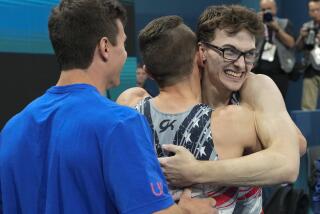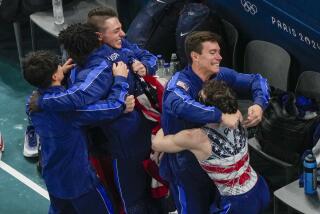Vinci Was the Last to Succeed : U.S. Has Not Won Weightlifting Gold Since 1960 Games
- Share via
CLEVELAND — Despite the current interest in body building and power lifting, American Olympic gold medals in weightlifting are only a distant memory since Charles Vinci won the last gold in Rome in 1960.
Vinci, now 55, took the gold in the 56-kilogram (123.2 pounds) Bantam Division in a sport now dominated by Russians, Bulgarians and other Eastern bloc countries.
“I used to dream of just having state records,” said Vinci. “The will of the Lord came through.”
But veteran weightlifters and coaches in the sport say Vinci’s dedication and opportunity to train full-time mean Vinci may be the last American medalist in weightlifting.
That’s because Vinci had a unique training situation similar to the conditions and life style of the Eastern bloc athletes.
“We were the best in the world until 1952,” said Rudy Sablo, 70, a former board member of the U.S. Weightlifting Federation who has been lifting weights for 50 years and operates the Titan Weightlifting Assn. club in New York.
“We can’t pick our athletes at six or eight years old, and in those (Eastern bloc) countries, it’s an advantage to train. In the United States, it’s a sacrifice.”
Vinci’s start in the sport is reminiscent of Charles Atlas, the proverbial 98-pound weakling who grew into a muscleman through diligent training.
At 4-foot 11 1/2-inches, Vinci grew up fighting turf battles in Cleveland, where he vied with other shoeshine boys for street corners on which to operate.
“You had to battle your way to school and battle your way back home,” said Vinci, a steelworker for 31 years.
At 14, Vinci began pushing weights at the Central YMCA in Cleveland before meeting John Schubert, 66, who offered Vinci a full-time training opportunity.
“He came and lived with me for about seven months,” said Schubert, an ex-Marine who has been working out with weights for 52 years and opened the Olympic Health Club on the city’s west side after World War II ended.
“He lived in a back room of my gym and sometimes I’d come and check on the gym late at night and he’d be working out,” Schubert said. “I’d tell him he had to rest some time.”
Then Vinci heard about York Barbell Club which operated in conjunction with York Barbell Club, York, Pa., and was coached by former Olympic weightlifter John Terpak.
“He showed up one day and he liked the place because we had national champions at the barbell company and training at the facility,” said Terpak, 76, who placed fifth in the 148-pound weightlifting division in the 1936 Olympics and fourth in the same division in the 1948 Olympics.
Terbak said Vinci showed promise and he was hired at the affiliated York Barbell Co. in a job which, like conditions in socialist countries today, allowed him to train all day.
“At his job, there was nothing that required him to be here,” said Terpak. “He just came in when he was rested up and trained on company time.”
The training paid off and in 1956 Vinci won the gold in weightlifting, a sport that then combined the press, snatch, and clean and jerk but no longer includes the press.
“I started our country off with a bang,” said Vinci, referring to his gold medal, the first won by the United States in the 1956 Melbourne games.
Vinci repeated his gold medal performance in Rome and continues to weightlift today, saying he can still “play around with 400 pounds.”
As for future U.S. gold medals in weightlifting, Schubert, who competes in masters weightlifting tournaments and has trained national champions at his club, remains doubtful, given the competition’s training methods.
“A man who has to make a living can’t compete,” Schubert said. “If I had a chance to work with someone twice a day, six days a week, I could get the same results. These people are taken care of from cradle to grave.”
In addition to ideal training conditions, the successful European athletes are selected by coaches at a young age, based on body build, said Schubert, who said he has discussed the European training techniques with Olympic coaches.
“The Russians and Bulgarians will go to a health club and check (athletes’) body builds and then check his temperament,” said Schubert. “You can’t just have genetics, you have to have the desire.”
While Terpak said he has trained a lot of great weightlifters, Vinci’s attitude is what made him successful.
“He lifted his heart out for the glory of it, I suppose. There was hardly anything else,” Terpak said.
More to Read
Go beyond the scoreboard
Get the latest on L.A.'s teams in the daily Sports Report newsletter.
You may occasionally receive promotional content from the Los Angeles Times.






